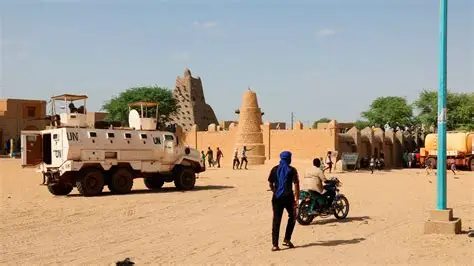A wave of coordinated attacks by the Al-Qaeda-linked group Jama’at Nusrat al-Islam wal-Muslimin (JNIM) in Mali has led to the abduction of three Indian nationals, raising fresh concerns over the safety of foreign workers in the conflict-ridden West African nation.
BY PC Bureau
Heavily armed militants launched simultaneous attacks across at least seven towns in western and central Mali, striking both military and civilian infrastructure on July 1. One of the key targets was the Diamond Cement Factory in Kayes, near the Senegalese border, where three Indian nationals working at the facility were abducted. A Chinese national was also taken hostage in the same assault.
Other affected towns included Diboli, Sandaré, Nioro du Sahel, Gogui, Molodo, and Niono. In Kayes, residents reported heavy gunfire and explosions near the governor’s residence and a local military base. “There’s gunfire, and I can see smoke rising near the governor’s residence from my window,” a local told AFP.
JNIM later claimed responsibility, stating that its fighters had overrun three military camps and shelled a base in Molodo with artillery. In response, Malian security forces claimed to have neutralized over 80 militants and recovered arms and vehicles. The junta imposed a 30-day night curfew in Kayes and Dioïla, and restricted movement and transport across affected regions.
India expresses deep concern regarding abduction of three Indian nationals employed at Diamond Cement Factory in Kayes, #Mali.
India unequivocally condemns this act of violence and calls upon the Government of Mali to take all necessary measures to secure safe and expeditious… pic.twitter.com/0xFmXmjC13
— All India Radio News (@airnewsalerts) July 2, 2025
India’s Response: Condemnation and Rescue Efforts
India’s Ministry of External Affairs (MEA) condemned the abduction, calling it a “deplorable act of terror.” The MEA stated that securing the safe return of the hostages was a top priority. Indian officials in Bamako are coordinating closely with Malian authorities, the Diamond Cement Factory, and local security forces. The MEA is also in touch with the families of the victims, offering updates and consular support.
READ: Dalai Lama’s Succession Plan Sparks Rift with China, Global Support Swells
“The safety and welfare of Indian nationals abroad is a matter of utmost importance for the Government of India,” the ministry said, urging all Indians in Mali to remain vigilant and stay in contact with the embassy.
Rising Threat in Mali’s Troubled West
Since 2012, Mali has battled a growing jihadist insurgency, with JNIM exploiting porous borders, economic hardship, and political instability to expand its reach. Kayes, a vital trade and transport hub connecting Mali with Senegal, has seen JNIM attacks surge sevenfold from 2021 to 2024.
Despite the Malian junta’s alliance with Russian-backed Africa Corps mercenaries and its exit from French and ECOWAS support, extremist violence has escalated. JNIM’s recent operations show an alarming shift westward, raising fears of cross-border violence in Senegal and other neighbors.
READ: Manipur Scrambles to Track Burnt, Looted Homes for SC’s Case
Implications for India and the Global Community
The abduction of Indian workers underscores growing threats to foreign nationals involved in key industries such as cement and mining, which have increasingly become targets of jihadist extortion and control. India may now face pressure to review its risk assessments in volatile zones like the Sahel and bolster diplomatic mechanisms to protect overseas citizens.
The international community, already concerned about Mali’s worsening crisis under military rule, is watching closely. JNIM’s bold moves, including targeting foreign nationals, could further destabilize a fragile region and complicate counter-terrorism efforts.














